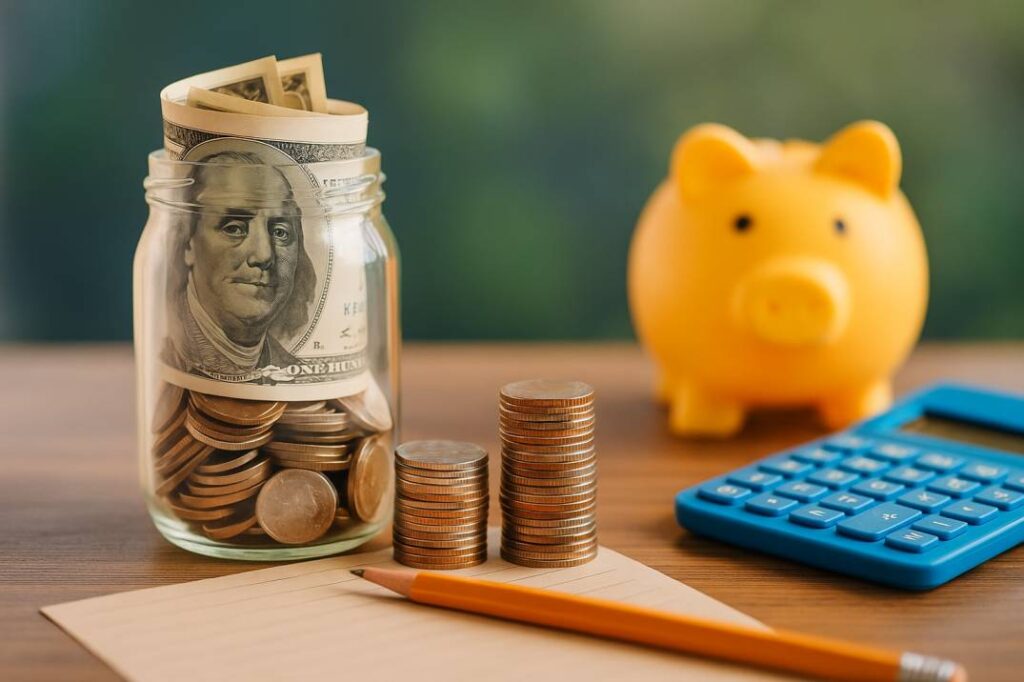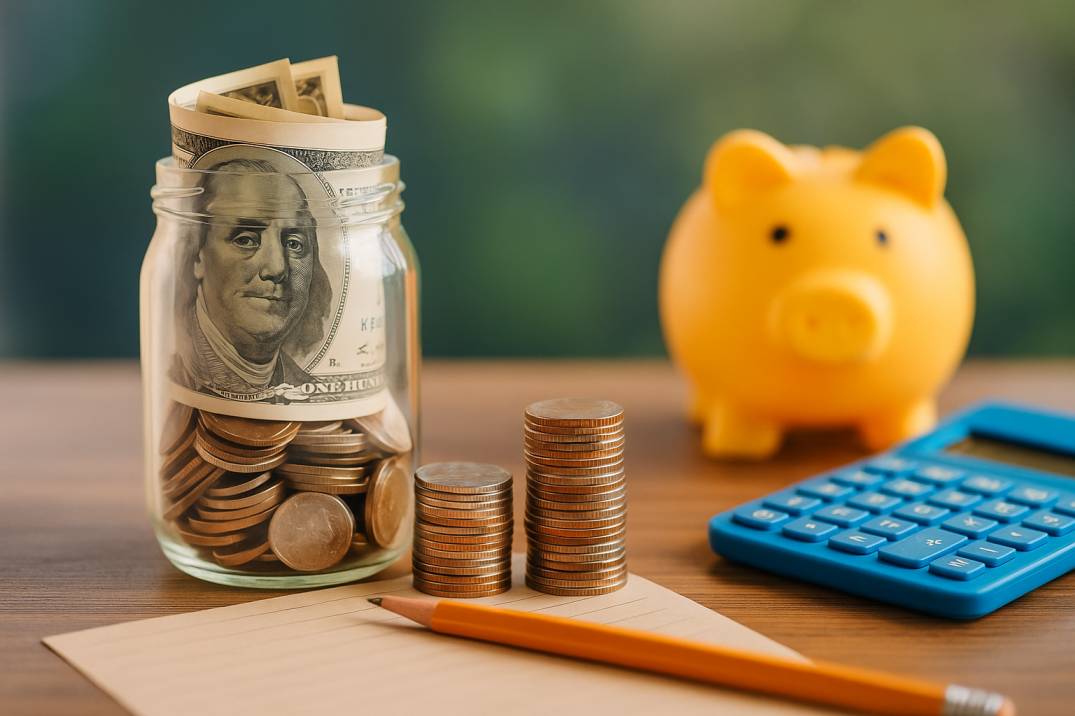Saving money isn’t just about cutting back, it’s about creating space for what truly matters: freedom, security and peace of mind. In a world full of daily obligations and constant financial pressure, setting money aside can feel challenging, but with the right mindset and consistent habits, it’s absolutely achievable no matter your income level or financial starting point.
Whether you’re just beginning to get your finances in order or looking for new ways to optimize your current plan, revisiting the fundamentals of saving is always a smart move, you might be trying to pay down debt, build up an emergency fund, prepare for a big purchase or simply create more breathing room in your monthly budget. In any case, small, intentional changes in how you handle money can lead to powerful results over time.
In this guide, you’ll find 20 essential tips on how to save money that are practical, realistic and easy to implement. These strategies are designed to help you gain control of your finances, make more mindful decisions and move confidently toward your financial goals one step at a time.
Key Takeaways
- Creating a budget helps you track spending and identify savings opportunities.
- Automating savings makes it easier to set aside money without thinking about it.
- Cutting unnecessary subscriptions can free up extra cash each month.
- Shopping sales and using cash back apps can maximize your savings on purchases.
- Meal prepping can significantly reduce your grocery bills and food waste.

Create A Budget
Okay, so you wanna save some cash? First things first: you absolutely gotta create a budget. It might sound boring, but trust me, it’s the foundation for everything else. Think of it as giving your money a job instead of just letting it wander off and disappear.
- Figure out where your money is going.
- Set some realistic goals.
- Track your progress (and don’t beat yourself up if you slip up).
Budgeting isn’t about restricting yourself, it’s about making informed choices. It’s about knowing where your money goes so you can make it work for you, not against you. It’s about aligning your spending with your values and goals.
I remember when I first started budgeting, I was shocked at how much I was spending on takeout coffee. Seriously, it was like a second rent payment! Once I saw that, I was able to make some changes and start saving for a trip I’d been dreaming about for years, it all starts with knowing where your money is going.
There are tons of ways to do it, you can use an app, a spreadsheet or even just a good old-fashioned notebook. The important thing is to find a system that works for you and that you’ll actually stick with, don’t overcomplicate it, keep it simple, keep it real and keep it consistent.
Automate Your Savings
Great, so you know you should be saving, but actually doing it? That’s the hard part, right? One of the easiest ways to make sure you’re putting money away is to automate the process, seriously set it and forget it, you’ll barely even notice the money’s gone and your savings account will thank you.
Here’s the deal:
- Set up automatic transfers from your checking account to your savings account. This is the big one, treat it like a bill you have to pay each month, even if it’s just a small amount to start, it adds up over time.
- Take advantage of direct deposit. A lot of employers let you split your paycheck into different accounts. Have a portion go straight into savings, it’s like magic!
- Use apps or online tools that round up your purchases and automatically save the difference, every little bit helps.
Automating your savings is like putting your financial life on autopilot, you’re making a conscious decision to save, but you’re taking the daily willpower out of the equation. It’s a game-changer.
Think about it: even $25 a week adds up to $1300 a year. That’s a nice little chunk of change for emergencies, a vacation, or paying off debt. Plus, you can always adjust the amount as your income increases or your expenses decrease. It’s all about making saving as easy and painless as possible. Seriously, do it today. You won’t regret it.
Cut Unused Subscriptions
How about subscriptions? They’re everywhere, right? Streaming services, apps, magazines… it’s easy to lose track of what you’re actually paying for. I know I’ve been there, you sign up for a free trial, forget about it and then BAM! You’re getting charged every month for something you don’t even use, it’s like throwing money away.
Take a good, hard look at your bank statements and credit card bills, seriously, go through them line by line, you might be surprised at what you find. I bet you’ll find at least one subscription you forgot about.
Here’s a little story: I was helping my mom with her finances and we found she was paying for three different streaming services, but she only ever watched one! We canceled the other two and now she’s saving like $30 a month. It’s not a ton, but it adds up, in a year we are talking about saving $360 additionally.
Canceling unused subscriptions is one of the easiest ways to save money without really changing your lifestyle. It’s basically free money!
Use Cash Back Apps
Who doesn’t love free money? Cash back apps are seriously one of the easiest ways to save without really trying. I mean, you’re already buying stuff, right? Why not get a little something back for it?
There are tons of apps out there, and they all work a little differently. Some give you points for scanning receipts, others offer cash back when you shop through their links, and some even give you rewards for just linking your credit card. It’s kind of wild how many options there are.
- Fetch Rewards is super popular because you can scan almost any receipt and get points. It’s great for everyday stuff like groceries. Check out the top cash-back apps to find the best one for you.
- Ibotta is another good one, especially for groceries, you have to select offers before you shop, but the cash back can be pretty good.
- Rakuten (formerly Ebates) is awesome for online shopping, you just go to their website or use their browser extension, click on the store you want to shop at and you automatically get cash back on your purchases.
I started using cash back apps a few years ago and I’m honestly surprised at how much I’ve saved. It’s not a ton of money each month, but it definitely adds up over time plus it feels like I’m getting paid to shop, which is always a win.
It’s worth checking out a few different apps to see which ones work best for your shopping habits and don’t forget to read the fine print, some apps have minimum payout amounts or other restrictions. But overall, cash back apps are a no-brainer for anyone looking to save a little extra money.
Shop Sales And Clearances
Okay, so who doesn’t love a good sale? Seriously, though, being strategic about when you buy things can save you a ton of money. It’s not just about impulse buys, but about planning and waiting for the right moment. Think about it: retailers often have predictable sales cycles, knowing when these happen can really help you snag what you need without breaking the bank.
Timing is everything when it comes to sales.
Here’s the deal, major retailers usually have big sales around holidays like Memorial Day, Labor Day and of course, Black Friday. However don’t forget about smaller, seasonal clearances, for example you can often find great deals on summer clothes at the end of July or August and back-to-school sales can also be a good time to stock up on more than just school supplies.
Keep an eye out for those clearance racks, they’re often goldmines if you’re patient enough to sift through them.
Planning your purchases around these events can lead to significant savings over time. It’s about being proactive and thinking ahead, rather than buying things at full price when you don’t have to.
Here are some ideas:
- Check out end-of-season sales for clothing and accessories.
- Look for deals on electronics around Black Friday and Cyber Monday.
- Consider shopping at consignment and thrift stores for unique finds at lower prices.
Also, don’t forget to compare prices, just because something is on sale doesn’t mean it’s the best deal out there, use your phone to quickly check prices at other stores or online before you commit to buying. A little bit of research can save you from overpaying, even when something is marked down.
Meal Prep
Let’s talk about meal prepping, honestly it might sound like a huge commitment, but trust me, it’s a game-changer for your wallet. I used to think it was only for super-organized people, but I gave it a shot and now I’m hooked. It’s all about planning and cooking meals in advance, so you’re not tempted to order takeout every night besides you know exactly what you’re eating, which is a bonus.
The habit of meal prepping saves you money and time, think about it, no more last-minute grocery runs for random ingredients, no more impulse decisions at restaurants and no more food waste because you actually use what you buy. It’s a win-win-win situation.
I usually spend a couple of hours on Sunday afternoons prepping for the week and it makes my weekdays so much easier.
Meal prepping isn’t just about saving money, it’s about taking control of your diet and your schedule, it reduces stress during the week and helps you make healthier choices. It’s a small investment of time that pays off big in the long run.
Here are some things to keep in mind:
- Plan your meals for the week. Check out meal plan examples online for inspiration.
- Make a shopping list and stick to it. Avoid impulse buys!
- Cook in bulk and portion out your meals into containers.
- Store your prepped meals in the fridge or freezer.
- Enjoy your stress-free and budget-friendly week!
It’s not always perfect and sometimes I still crave a pizza on Friday night, but overall, meal prepping has made a huge difference in my spending habits. Give it a try, you might be surprised at how much you save!
Choose Generic Brands

So hear me out, I know some people are super loyal to their name brands, but honestly, sometimes it’s just paying for the label. I’ve been trying to switch to generic brands more often and it’s surprising how much you can save besides it’s not always about sacrificing quality either.
I remember when I first started doing this, I was skeptical. Like, will the generic cereal actually taste good? Will the store-brand lactose-free milk be watery? But most of the time, it’s totally fine, and sometimes it’s even better! The savings add up, especially if you’re buying a lot of the same stuff every week.
It’s worth giving it a shot, especially for things like pantry staples or cleaning supplies, uou might be surprised at how little difference there is, and your wallet will definitely thank you.
Here’s a quick breakdown of where I’ve seen the biggest savings:
- Over-the-counter meds: Think pain relievers, allergy pills, etc. The active ingredients are usually the same.
- Pantry items: Flour, sugar, spices, canned goods. These are often identical to name brands.
- Cleaning supplies: Dish soap, laundry detergent, all-purpose cleaners. Again, the difference is minimal.
Limit Eating Out
Okay, let’s be real, ordering takeout is easy and going to restaurants is fun, but man, does it add up! The average American spends a good chunk of change on dining out every month. It’s one of those expenses that can sneak up on you if you’re not careful. So, how do we enjoy food without breaking the bank?
- Cook more meals at home. I know, I know, it’s not always the most exciting option, but it’s almost always cheaper and you know exactly what’s going into your food.
- Pack your lunch, even just doing this a few times a week can make a difference, leftovers are your friend!
- Look for deals, happy hour specials, early bird menus and lunch specials can help you enjoy eating out without the full price tag.
I started tracking how much I was spending on food delivery and it was shocking, just seeing the numbers made me want to cut back. Now, I try to cook at least four nights a week and I’ve saved a ton of money.
Consider splitting an entree with a friend or opting for appetizers instead of a full meal, skipping drinks and dessert can also help you save a few bucks. It’s all about making small changes that add up over time and you can still enjoy going out, just do it a bit less often. Maybe try a no-spend challenge for a week or two to reset your habits.
Use Public Transportation
Do you love driving? I get it, but have you actually looked at how much it costs these days? The gas prices are wild and parking? Forget about it, public transportation might not always be the fastest or most glamorous option, but it can seriously save you some cash.
Think about it: no more gas, no more parking fees and less wear and tear on your car plus you can read a book or catch up on emails during your commute. It’s a win-win, really.
Here are some things to consider:
- Calculate the real cost of driving: Include gas, insurance, maintenance and depreciation.
- Explore public transit options: Check out bus routes, train schedules and bike-sharing programs in your area.
- Consider carpooling: If public transit isn’t feasible, carpooling with coworkers or neighbors can still save you money.
I know, I know, public transportation isn’t always perfect. There might be delays, crowds or inconvenient routes, but even if you only use it a few times a week, you can still save a significant amount of money over the course of a year and who knows, you might even enjoy it!
Set Clear Savings Goals
So you wanna save money, right? Just saying “I want to save” isn’t gonna cut it, you need actual real goals. Think of it like this: if you don’t know where you’re going, how will you know when you get there? It’s like driving without a map, you might end up somewhere interesting, but probably not where you intended to go.
Setting clear savings goals is important because it gives you something concrete to work towards. It’s way easier to stay motivated when you have a specific target in mind and it helps you prioritize your spending. Do you really need that new gadget or are you saving for something bigger?
Let me explain:
- Figure out what you’re saving for. Is it a down payment on a house? A vacation? Paying off debt? An emergency fund? Be specific.
- Put a number on it. How much money do you actually need to save? Vague goals like “save more money” are useless, aim for something like “save $5,000 for a down payment.”
- Set a deadline. When do you want to achieve your goal? This adds a sense of urgency and helps you break down your goal into smaller, manageable steps.
Think of your savings goals like a GPS for your money. They tell you where to go and how to get there and without them you’re just wandering around aimlessly, hoping to stumble upon financial success. Let’s be honest, that’s not a great strategy.
So, get clear on what you want, how much it costs and when you want it. Your future self will thank you.
Negotiate Your Bills
I used to just pay whatever was on the statement without a second thought, then I realized, why not try to lower them? The worst they can say is no, right?
First off, do some research, see what others are paying for similar services in your area, knowledge is power! Then, call up your service provider, internet, phone, insurance and be polite but firm.
Explain that you’ve been a loyal customer and you’re looking for ways to cut costs, you might be surprised at how willing they are to work with you, sometimes just mentioning that you’re considering switching to a competitor is enough to get them to lower your rate.
I once saved $30 a month on my internet bill just by calling and asking! It took maybe 15 minutes and now that’s $360 a year back in my pocket. Seriously, give it a try.
Here’s a few things you can try:
- Bundle services: See if you can bundle your internet, cable and phone services for a lower price.
- Ask about discounts: Many companies offer discounts for students, seniors or military personnel.
- Shop around: Compare prices from different providers to see if you can get a better deal elsewhere.
According to financial planners, medical bills are the easiest to negotiate, but don’t stop there. Try negotiating everything! You’ve got nothing to lose and potentially a lot to gain, it’s all about being proactive and not being afraid to ask, you might be surprised at the savings you can achieve with a little negotiation.
Shop With A List
Okay, so you’re trying to save some cash, right? One of the simplest, yet most effective ways to do that is to shop with a list, it’s a game-changer. I used to wander around the store, grabbing whatever looked good and then I’d get to the checkout and be like, “Whoa, how did this happen?” Now, I make a list before I even leave the house and it helps a ton.
First off, making a list forces you to actually think about what you need, no more impulse buys of that weird snack you’ll probably regret later plus it keeps you focused, you go in, get what’s on the list, and get out, no distractions, no extra stuff.
This is like a mission, and you’re a budget ninja, I’ve found that I save money on groceries just by sticking to the plan, it’s not rocket science, but it works.
I started doing this a few months ago, and it’s crazy how much less I spend, I used to just grab whatever looked good, but now I actually think about what I need before I go to the store. It’s like having a personal shopper, but it’s just me being organized. Try it, you might be surprised.
Here’s a little breakdown of how it helps:
- Reduces impulse buys
- Keeps you focused
- Saves time and money
It’s all about being intentional with your spending, if you don’t plan, you’re basically giving your money away. So, grab a pen and paper (or use your phone, whatever), make a list, and stick to it, your wallet will thank you.
Cancel Unused Gym Memberships
This is a classic, you signed up for that gym membership with the best intentions, right? New year, new you, all that jazz, but let’s be real, how often are you actually going? If the answer is “not often enough to justify the cost,” it’s time to cut the cord, canceling that unused gym membership can free up a surprising amount of cash each month.
Here’s the thing: gyms count on people not using their memberships, it’s part of their business model, don’t let them profit from your good intentions gone astray.
There are plenty of ways to stay active without shelling out big bucks for a gym you barely visit, that money could be going towards something you actually enjoy, like a weekend getaway or paying off debt.
Here are some things to consider:
- Explore free alternatives: Parks, trails and even YouTube workout videos can provide a great workout without costing a dime.
- Home workouts: Invest in some basic equipment like resistance bands or dumbbells for effective workouts at home.
- Check your gym’s cancellation policy: Some gyms make it difficult to cancel, so be prepared to jump through some hoops, read the fine print and know your rights.
It’s easy to forget about that monthly gym charge, especially if it’s automatically deducted from your account, but those small amounts add up over time. Take a look at your bank statements and see where your money is going, you might be surprised at how much you’re spending on things you don’t even use.
Don’t feel guilty about canceling, you’re not failing but just being smart about your money. Find an activity you genuinely enjoy and that fits your budget, your wallet (and your body) will thank you.
Take Advantage Of Discounts
Trying to save some cash, right? Don’t just blindly buy stuff! Loads of places offer discounts you might qualify for, it’s like free money, basically.
Think about it: student discounts, senior discounts, military discounts… they’re everywhere! Always ask if a discount is available, you’d be surprised how many places don’t advertise them but will happily knock a bit off the price if you just ask.
Here’s a quick rundown of discounts to keep an eye out for:
- Student discounts (if you’re in school)
- Senior discounts
- Military/veteran discounts (thank you for your service!)
- Teacher discounts (for all the educators out there)
- First responder discounts (police, firefighters, EMTs, etc.)
Don’t be shy about asking! The worst they can say is no, and you’re back where you started, but if they say yes? Savings!
Plan Free Activities

It’s easy to think that having fun requires spending money, but that’s just not true! There are tons of free things to do if you just get a little creative. Think about all the ways you can enjoy your time without opening your wallet.
- Check out local parks and trails for hiking or biking.
- Attend free community events like concerts or festivals.
- Visit museums or art galleries on their free admission days.
- Organize a potluck with friends instead of going to a restaurant.
- Have a game night at home with board games or card games.
I remember one summer where my friends and I challenged ourselves to only do free activities, we explored every park in the city.
Another great idea is to look into what your local library offers, many libraries have free events, workshops and even access to streaming services. Libraries are a goldmine of free entertainment and resources.
Limit Online Shopping
Online shopping is so easy, isn’t it? Too easy, maybe. It’s like the stores are always open, and those targeted ads? They really get you sometimes, but all that convenience can seriously mess with your budget. Let’s look at ways to dial it back a bit.
- Delete shopping apps: Seriously, just do it. Out of sight, out of mind.
- Unsubscribe from email lists: Stop the temptation before it even hits your inbox.
- Shop in person: Sometimes, actually going to a store makes you think twice about buying stuff.
I found that putting items in my online cart and then just… leaving them there for a day or two really helps. Most of the time, I forget about them or I realize I didn’t really need them in the first place.
One trick I’ve been trying is to make it a pain to buy things online, I don’t save my credit card info on sites anymore. It’s annoying to type it in every time, but it definitely makes me think twice before hitting that “buy” button and it’s amazing how much that little bit of friction can help, you might also consider monitoring stress-related spending to identify triggers for online shopping.
Buy In Bulk
Okay, so buying in bulk can seriously save you some cash, but you gotta do it right.
First off, think about what you actually use a lot of, non-perishable stuff is your best bet here. We’re talking toilet paper, cleaning supplies, maybe some canned goods, stuff that won’t go bad if you don’t use it right away.
Buying in bulk isn’t always cheaper, you really need to check the unit price to make sure you’re getting a deal, sometimes the smaller size is actually cheaper per ounce or whatever. Also, think about storage. Do you even have room for 50 rolls of paper towels?
Here’s a few things to keep in mind:
- Compare unit prices: Don’t just assume the big size is cheaper. Do the math!
- Check expiration dates: Make sure you can use it all before it expires.
- Consider storage space: Do you have room for all that stuff?
Buying household supplies in bulk can be a game changer if you plan it out. I’ve found that using “Subscribe and Save” options online can also help get regular shipments at a discount.
Review Your Insurance Policies
This is one of those things we all need, but nobody really wants to think about, but trust me, taking a little time to review your policies can save you a surprising amount of money. I know, it sounds boring, but stick with me.
First off, when was the last time you actually looked at your coverage limits? Seriously, dig out those documents (or log into your online account) and see what you’re actually covered for, you might be paying for coverage you don’t need, or worse, you might be underinsured.
Here’s a few things to consider:
- Shop around: Don’t just stick with the same insurance company year after year, get quotes from multiple providers to see if you can find a better rate, comparison sites make this pretty easy.
- Bundle your policies: Many insurance companies offer discounts if you bundle your auto, home and other policies together. It’s worth checking out.
- Increase your deductible: A higher deductible usually means a lower premium, just make sure you can actually afford to pay that deductible if something happens.
Also, don’t forget to check for discounts, you might be eligible for discounts based on your profession, your driving record or even your affiliations. It never hurts to ask! While you’re at it, take a look at your life insurance, home insurance and even pet insurance, you might be surprised at what you find.
Grow Your Own Food

You don’t need to become a full-blown farmer, but growing even a little bit of your own food can seriously cut down on grocery costs and there’s something super satisfying about eating something you grew yourself. It’s easier than you think to start small and you don’t need a huge yard to do it.
- Herbs are super easy to grow in pots on a windowsill. Think basil, mint, or chives.
- Tomatoes and peppers do well in containers on a balcony or patio.
- Even a small patch of lettuce or spinach can save you money on salads.
Gardening can be a fun and rewarding way to save money and eat healthier.
Utilize Library Resources
Libraries aren’t just about books anymore, they’re like treasure troves of free stuff and services, you can find all sorts of things there, and it’s all free with your library card. It’s a great way to save on entertainment and resources.
- Borrow books, movies and music instead of buying them. This is a no-brainer, but it’s worth repeating. Think about how much you spend on books and movies each year. It adds up fast!
- Attend free workshops and events. Libraries often host workshops on everything from resume writing to crafting. It’s a great way to learn new skills and meet people.
Libraries also offer a bunch of online resources, like e-books, audiobooks and streaming services. You can access these from home, so you don’t even have to leave the couch. It’s like having a whole world of entertainment at your fingertips and it doesn’t cost a thing.
Refinance Loans
Okay, so refinancing loans might sound intimidating, but it’s worth looking into. Basically, it means replacing your current loan with a new one, ideally with better terms. Think of it as a financial makeover for your debt, it could seriously free up some cash each month.
The goal is simple: save money.
Interest rates fluctuate and your financial situation changes. What seemed like a good deal a few years ago might not be the best option now. Let’s break down how to make it work for you.
- Check Your Credit Score: A better credit score often means a lower interest rate. Before you even start looking at new loans, see where you stand. You can usually get a free credit report from several websites.
- Shop Around: Don’t just go with the first offer you see, get quotes from multiple lenders like banks, credit unions and online lenders all have different rates and fees. Compare them carefully.
- Consider All the Costs: Refinancing isn’t free. There might be application fees, appraisal fees or other charges, make sure the savings from a lower interest rate outweigh these costs. Use a mortgage refinance calculator to estimate potential savings.
I remember when my sister refinanced her mortgage. She was hesitant at first because of the upfront costs, but after doing the math, she realized she’d save thousands of dollars over the life of the loan. It made a huge difference in her monthly budget.
Refinancing isn’t just for mortgages, either. You can refinance student loans, auto loans and even personal loans. The key is to do your homework and make sure it makes financial sense for you. It’s all about finding a better deal and putting more money back in your pocket.
Limit Credit Card Use
Credit cards can be super useful, but they can also be a trap if you’re not careful, it’s easy to swipe now and worry about the bill later, but that’s a quick way to end up in debt. Let’s be real, seeing that balance grow can be pretty stressful. So, how do we keep those cards in check?
- Switch to Cash: Try using cash for everyday purchases. It’s often harder to part with physical money, which can make you think twice before buying something.
- Track Your Spending: Keep an eye on your credit card statements, spotting those little charges that add up is key. Reviewing your credit card statements carefully can help you flag any recurring expenses you can eliminate.
- Avoid Impulse Buys: Give yourself a cooling-off period before making non-essential purchases. That new gadget might seem cool now, but will you really need it next week?
Using credit cards wisely is all about being mindful. It’s not about cutting them up entirely (unless you really need to!), but about using them strategically. Think of them as tools, not free money.
One of the best ways to limit credit card use is to understand your spending habits. Are you swiping for coffee every morning or maybe those late-night online shopping sprees are the culprit? Identifying these patterns is the first step to breaking them.
Consider setting a monthly spending limit on your credit cards and sticking to it. It’s like giving yourself an allowance, but for grown-ups.
Create A No-Spend Challenge
Let’s talk about the no-spend challenge. It sounds intense, and it can be, but it’s also super effective for resetting your spending habits. Basically, you pick a period like a day, a week or even a month where you only spend money on absolute necessities. Think rent, utilities, maybe groceries if you’re running low. Everything else is off-limits.
- It’s a great way to see where your money is actually going.
- It forces you to get creative with what you already have.
- It can be surprisingly fun (in a weird, frugal way).
Here’s how to make it work:
- Plan ahead. Look at your calendar and pick a time when you don’t have any major events or obligations that will require spending.
- Set clear rules. What’s allowed? What’s not? Be specific. For example, maybe gas for your car is okay, but eating out is not.
- Tell your friends and family. This helps with accountability and also lets them know why you might be turning down invitations, maybe you can even join a community for support.
- Find free activities. Instead of going to the movies, have a game night at home instead of shopping, go for a hike. Get creative!
- Utilize resources at home, cook meals using ingredients you already have, read books from your bookshelf instead of buying new ones. This is the time to seek out free activities and use what you’ve got.
It’s not about depriving yourself forever, it’s about being more mindful and intentional with your money, you might be surprised at how much you can save in a short amount of time.
Utilize Coupons
Okay, so coupons might seem a bit old-school, but trust me, they’re still a great way to save some cash. It’s not just your grandma clipping them from the Sunday paper anymore. There are tons of digital options now, making it easier than ever to find discounts on stuff you actually buy. I mean, who doesn’t like saving money, right?
Coupons can seriously cut down your grocery bill and they’re not just for groceries either.
- Check online coupon sites and apps. There are tons of them out there, like Coupons.com or Rakuten, that offer digital coupons you can use online or in stores.
- Sign up for store loyalty programs, most grocery stores have loyalty programs that give you access to exclusive deals and digital coupons.
- Use browser extensions like Honey that automatically find and apply coupons when you’re shopping online. It’s like magic!
I remember one time, I was buying a new coffee maker online, and Honey found a coupon that saved me like 20 bucks. It was awesome! It’s definitely worth checking out.
Evaluate And Adjust Regularly
So you’ve put all these saving tips into action. Great! But here’s the thing: life changes and what worked in January might not work in July. That’s why it’s super important to check in with your budget and savings plan on a regular basis. Don’t just set it and forget it!
Think of it like this:
- Monthly Review: Take an hour each month to look at your spending. Did you stick to your budget? Where did you overspend? Where did you save more than expected?
- Quarterly Check-Up: Every three months, take a bigger picture look. Are your savings goals still realistic? Have your income or expenses changed significantly?
- Yearly Overhaul: Once a year, really dig in. Re-evaluate all your financial goals. Are you on track to meet them? Do you need to make major adjustments?
It’s easy to get discouraged if you slip up or if your savings plan isn’t working as well as you hoped. Don’t beat yourself up! Just figure out what went wrong and make adjustments. The important thing is to keep trying and to stay focused on your goals.
Maybe you started using a cash-back app that isn’t really giving you much back. Ditch it! Or maybe you found a cheaper internet provider. Awesome, update your budget! The point is to be flexible and to adapt to your changing circumstances.
It’s also a good idea to re-evaluate your savings goals themselves, maybe you initially wanted to save for a down payment on a house, but now you’re thinking about starting a business instead, your savings plan should reflect your current priorities.
Basically, saving money isn’t a one-time thing. It’s an ongoing process of evaluation and adjustment, stay on top of it, and you’ll be much more likely to reach your financial goals.
Wrapping It Up
We covered a lot and It’s okay to feel overwhelmed at first. The important thing is to begin, pick one or two ideas that feel manageable and let them become part of your routine.
Saving money isn’t about cutting out all the joy, it’s about making smarter, more mindful choices that align with your goals. Whether it’s planning your meals, skipping small impulse buys or finally tracking your expenses, each action adds up over time.
Stay patient, stay consistent and give yourself credit for every step forward. The results might not show overnight, but they will come and Your future self will thank you, one smart decision at a time. Happy saving!
Frequently Asked Questions
How can I start budgeting effectively?
To create a budget, track your income and expenses for a month and then identify areas where you can cut back and set limits on spending.
What are some easy ways to save money automatically?
You can set up automatic transfers from your checking to your savings account each month. This way, you save without even thinking about it.
How do I know which subscriptions to cancel?
Review your subscriptions and cancel any that you don’t use regularly. Look for services that you’ve forgotten about or don’t need anymore.
What should I do if I want to save money on groceries?
Consider meal prepping and buying in bulk. Also, choose generic brands instead of name brands to save more.
How can I save money on transportation?
Use public transportation, carpool or bike when possible. This can help you save on gas and parking costs.
What are some fun free activities to do?
Look for free community events, visit local parks or explore hiking trails. These can be enjoyable without costing anything.





